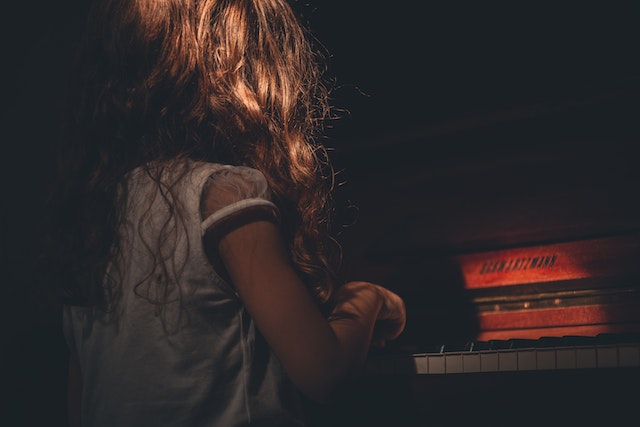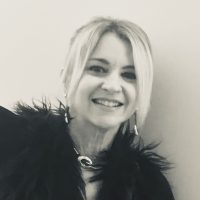I once knew a little girl who loved music.
At age four, she played “Jeremiah was a Bullfrog” (as she called it, but it’s better known as Three Dog Night’s “Joy to the World”) so many times on her record player that scratches in the vinyl eventually made it unplayable. It was her first favorite song.
At age six, she couldn’t wait to steal away and peck on her easy-play keyboard behind closed doors in her bedroom, engrossed in hitting the correct numbered keys to match the words she sang to “Paper Roses.”
At age eight, she loved singing hymns from the Catholic missalette her grandmother lifted from morning mass, their not-so-on-pitch harmony flowing on “Take Our Bread” and “Holy, Holy, Holy.” It was their special connection.
I remember her performing bedroom concerts at age 11, singing on a fist-made microphone to the “Saturday Night Fever” and “Grease” soundtracks. She wanted to be Olivia Newton-John, the musical hero she discovered at age nine. “Let Me Be There,” she fantasized.
But somewhere along the way, she stopped playing and performing. Though a soundtrack still ran alongside life, music had become a backdrop.
At 20, she enrolled in a college guitar class, but a series of life wrenches squeezed the desire shut.
In her circles, music wasn’t a responsible pursuit. It’s what you listened to in the car or while you were getting dressed. It’s what played when you went out with your friends. It was best consumed…streaming from the air waves or through the cassettes and concert tickets you bought. It wasn’t yours to create.
Realizing these stories were conditioned crap, I decided to give the little girl who loved music a voice again—I was 40.
On the pretense of putting my five-year-old into piano lessons, I signed us up with an in-home teacher. It was enough to resurface the old highs of the easy-play keyboard, yet it still protected me from the vulnerability of publicly doing something normally reserved for five to 15-year-olds.
At 52, I put another stake in the ground and revived my college flirtation with guitar. I had seen a flier for a “Girl Meets Guitar” class offered by Yamaha at a local coffee shop. That first day, I pulled into the parking lot and didn’t want to get out of the car. Panicking and pushing in tandem, I slinked in with eyes lowered and ducking under the guitar on my back. Friends and neighbors might see me, the imposter musician.
Still, I did three six-week sessions.
When it ended, I enlisted our teacher for private lessons because I knew I would only commit time that should be meant for family and work with a formal engagement that I was paying for, and, thus, needed to show up for.
Last night I did my third recital, the first playing guitar.
The other two recitals were piano performances. Though I’d been taking lessons on and off for 13 years, I had never participated in a recital or any kind of public performance. In the early years of lessons, I reserved participation in those events for my kids and the young students.
My current piano teacher works with a handful of adults and encourages us to push our limits. My first recital was just after the pandemic began in April 2020. I was 53. The second was a year ago.
For weeks ahead of each performance, I ruminated. All eyes and ears would be on me. I could hear them judge my age and my novice mistakes. Push, push, push; perfect, perfect, perfect was the MO I believed would keep me safe.
I woke each performance morning wanting the day to be over, fantasizing about falling into the couch like at the end of the first day of school or a new job—only this would be an order of magnitude worse. I would be on a stage, alone, on display, easy prey for the audience…even if it was only 30 people.
I labeled my first recital a colossal failure. Nerves in overdrive, I lost my way in the music and stopped for a long and mortifying pause, ineptitude hanging in the air. The second performance, a year ago, was an improvement, but my hands still shook uncontrollably for a good portion of the song.
Last night was different.
I was to play guitar, along with another adult student on piano, to accompany a group finale performance in a summer recital for the kids in my guitar teacher’s studio. Many students have disabilities, and her program provides music therapy for them.
All day leading up to the evening recital, my perfectionist in a duet with my inner critic kept singing the same tunes as before:
“Please let me make it through without getting lost in the music…again.”
“Please let me hit the F cord without f-ing up the bar.”
“Please let me not sound ‘tinny’ on the section when I pluck…”
But as I watched the students one by one doing their performances in the best way each could, something changed in me.
Some made it through as rehearsed.
Others only made a few sounds, hit a few strums, or sang a few bars.
For some, simply standing in front of the audience was accomplishment enough.
My chest and shoulders began to unclench. The fear tunes playing in my head were quieting.
With each song they performed, I came to understand the purpose of their expression, of any form of expression. It wasn’t about perfection or satisfying anyone’s expectations.
It was simply about the act of doing it.
I wanted to support them in this act, in their courage.
I began to get excited to play.
I wanted to enjoy the experience with them.
I wanted to be part of something with these other souls, each of us being seen and heard in a way that was right for us, as individuals, in that moment.
I was motivated to look beyond fear and lift the silence I had placed on the little girl who loved to make music for the sheer enjoyment of doing it.
I’m not sure if my guitar accompaniment during the performance was good or bad. I do know that the inner child I had made invisible to protect my vulnerability reckoned with the magic in these children.
In the smiles on each face after they finished, she understood that any form of expression, of our own experience, is beautiful.
She remembered being like them, playing on her easy keyboard and singing along—not stage-worthy by some standards, but satiating and satisfying to her.
I had worked with my invisible inner child over the past few years, but this experience gave me a new understanding. When I give her a voice and face her vulnerability, I feel connected and whole. Beyond healing her need to be invisible, I can experience new beginnings in old loves that had been tucked away in the shadows.
I believe that my piano and guitar lessons have served as unplanned forms of therapy, because I know that engaging with music is reviving more than the lost young musician in me.
It’s giving air to all the lost parts of me, like the one who used to write and share stories as an aspiring journalist in high school and college.
I call the lost little girl who loved music LP, short for Lisa Paige, and we are united again, here.
~
Please consider Boosting our authors’ articles in their first week to help them win Elephant’s Ecosystem so they can get paid and write more.
~









Read 13 comments and reply